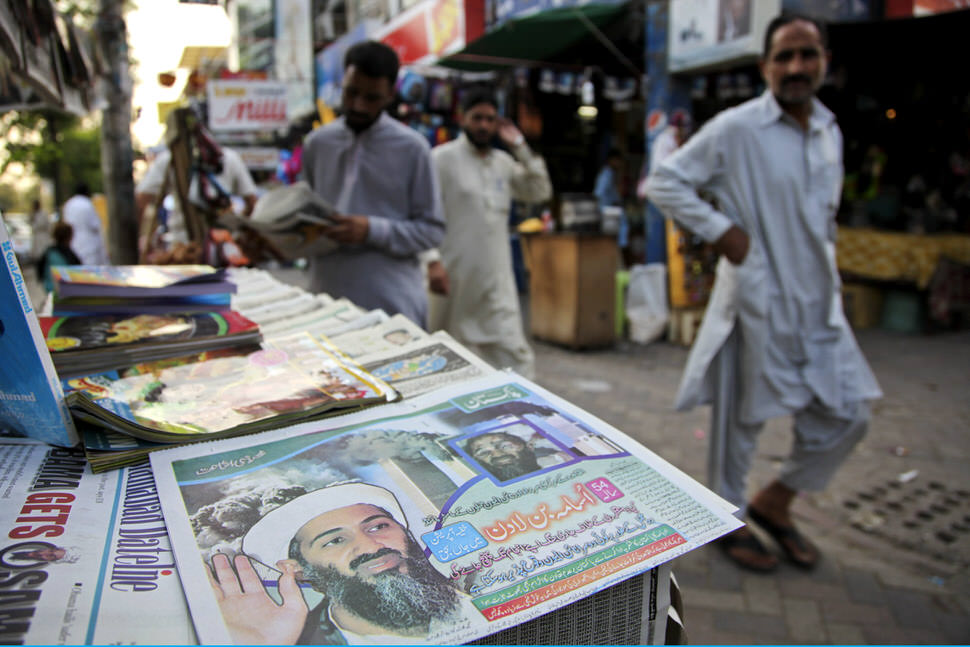News cameras may zoom lustily into Middle Eastern crowds that vow vengeance. Pundits can cleverly parse the praise for a fallen warrior voiced by the usual Islamist hotheads. Cooler analysts will fret over the uses of assassination as a tool of policy, or over the finer points of Muslim doctrine regarding burial at sea. Yet for the most part the demise of the world’s most wanted man has been met, across the Arab and Muslim worlds, with a very untelegenic shrug of indifference.
It is not just that the denouement to this long-drawn-out western—with the US cavalry scouring Islamic badlands for fully a decade before dispatching the outlaw—lacked the visual immediacy that the Middle East’s drama-saturated audiences have come to expect. Nor is it simply that the Arab public’s preoccupations are very localized right now, what with revolutions—few of which seem connected to radical Islam—bursting out across the region.
Long before the choppers dropped into Abbottabad, Osama bin Laden himself had faded from relevance. His messages to the world had grown fewer and increasingly divorced from the concerns of ordinary Muslims. The last audiotape attributed to him, released in November, singled out France for attack because of its strictures on the veil. Earlier last year he had blamed the West for global warming, blasted Pakistan’s efforts at relief following deadly floods, and railed against cartoons depicting the Prophet Muhammad—five years after the images first provoked Muslim protest. Few bothered to listen to such predictable bluster. Bin Laden’s words failed to rate highly even in the jihadists’ own patch of cyberspace, which tends to he dominated by techie talk on weapons and tactics. or equally arcane exegesis of musty Islamic texts.
In its ability to plan and carry out terrorism, bin Laden’s own outfit—often dubbed al-Qaeda Central by the terrorism tracking industry to distinguish the mother group’s Afghan and Pakistani bases from regional off-shoots—had long since lost its edge. Increasingly unable to mount new attacks or attract recruits and funding, it had effectively become little more than a brand name. Even the more active offshore franchises are small. Al-Qaeda in the Arabian Peninsula (AQAP), based in Yemen, fields perhaps four hundred men. AQIM, the Maghreb branch, has even fewer, and these seem mostly engaged in gangsterism, running drugs, protection rackets, and kidnapping rings across the emptiest sweep of the Sahara. Having failed to make political inroads, they seem to have been relegated to merely proving their existence by killing now and then. or blowing something up.
What bin Laden retained. to some extent, was his mystique. To many Arabs and Muslims he remained a romantic figure, despite the increasingly plain evidence that his tactics were not only bloody and immoral, but ineffective and, indeed, counterproductive for their declared goal of unifying Muslims in a global jihad.
Yet in many parts of the Middle East even bin Laden’s personal image had grown shopworn. Back in 2001 the calm, saintly, bearded visage with the wide eyes, the slender fingers caressing a Kalashnikov, and the combat jacket worn over a long white robe had seemed to some the epitome of jihadist cool. His escape into the mountains from the might of infidel hordes had a flying carpet quality. His defiance spoke to the wounded sensibilities of the many Muslims who had bought into the notion that their faith was the target of a millennial crusade.
Ten years later, such heroic posturing looks rather dated to a younger Arab generation that—in places like Tunis, Cairo, Muscat, and even Riyadh—is highly urbanized, increasingly sophisticated about the ways of the world, and impatient for gains in the here and now. The bin Ladenesque rhetoric of resistance to infidel encroachment continues to be a touchstone. The broader Islamist movement, of which the jihadist element is a marginal fringe, still finds it useful to view events in the prism of a perennial contest against the West (as is evident, for example, in the rhetoric of Hamas, which denounced the killing of bin Laden). But amid the swirling crowds of flag-waving citizens demanding change in the streets of nearly every regional capital, the distant figure of the fugitive warrior has grown obscured in the mist.



